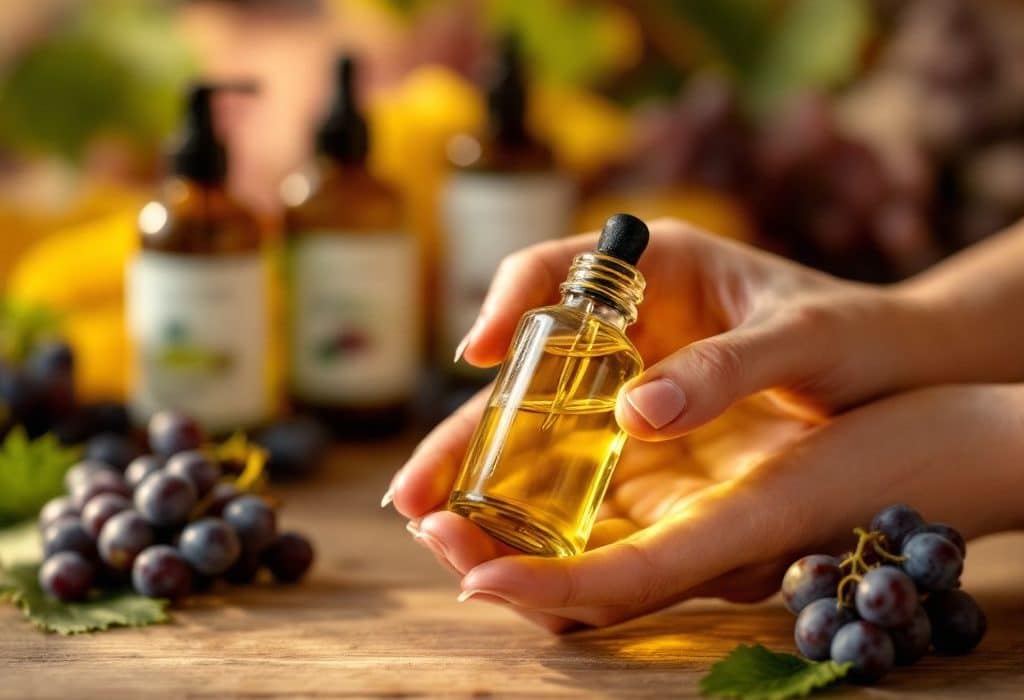Hey there, skincare enthusiasts and curious minds! 🚀 Let’s kick things off with a little scenario—imagine this: you’re standing in your local health store or scrolling through an online natural skincare aisle, faced with an overwhelming number of products. Your head’s swimming with questions, right? What works, what doesn’t, and more importantly, what’s actually good for your skin without breaking the bank or your environmental conscience? Enter grapeseed oil!
Why Grapeseed Oil? The Grape Power We’ve All Been Missing
Okay, here’s the deal. Grapeseed oil is one of those underrated ‘grape’ (pun intended) finds that often gets overshadowed by its more famous cousins like coconut and jojoba oil. But trust me, once you get to know grapeseed oil, you’ll wonder why you hadn’t jumped on the bandwagon sooner.
Grapeseed oil is derived from—you guessed it—grape seeds. It’s a byproduct of winemaking, which not only makes it sustainable but also available aplenty. And just between us, using a product that’s sustainable kind of feels like giving Mother Nature a high five, doesn’t it?
The Basics: Understanding Grapeseed Oil
Now, here comes the juicy stuff! Grapeseed oil is packed with omega-6 fatty acids, specifically linoleic acid, and vitamin E. These components make it an absolutely stellar candidate for moisturizing and nurturing your skin. If you’re someone who’s constantly battling dry or sensitive skin, or maybe you’ve got that oh-so-charming oily shine, grapeseed oil is your new best friend.
- Omega-6 Fatty Acids: These acids are essential for skin health and maintaining the skin’s barrier. They lock in moisture and fend off environmental foes.
- Vitamin E: Famous for its antioxidative properties, vitamin E helps protect your skin from pollution and UV damage while also evoking that youthful look we all secretly (or not so secretly) crave.
How to Use Grapeseed Oil in Your Natural Skincare Routine

Let’s get practical. Knowing the benefits is great, but how exactly do you incorporate grapeseed oil into your blossoming natural skincare routine? You might be worried about getting greasy, but don’t sweat it! Grapeseed oil is lightweight and absorbs quickly. Quick segue—think of it like that friend who pops by without overstaying their welcome.
1. Moisturizes Like a Boss
Use grapeseed oil as a moisturizer. Lightly massage a few drops of grapeseed oil onto your face and neck after cleansing, morning and night. It couldn’t be simpler, and your skin will thank you with that enviable glow. Plus, it acts as a perfect base if you’re applying makeup afterward.
2. Tackle Those Pesky Pores and Breakouts
Notice pores the size of craters and breakouts that demand attention just when you’ve got somewhere to be? Give grapeseed oil a shot. The linoleic acid content actually helps regulate your skin’s natural oil production, which is groundbreaking for those with acne-prone skin.
**Pro tip:** Mix a few drops of grapeseed oil with your favorite toner on a cotton pad and swipe it over your face. It removes dirt and unclogs pores—kind of like a gentle freeway for your skin.
3. Neatness Affair – Banishing the Freaky Shiny Face
Now, don’t misjudge this just because grapeseed oil *is* an oil. Its amazing non-comedogenic properties make it an excellent option to balance oily skin by hydrating it without adding to the oiliness.
4. Targeted Treatments for Ultimate Natural Skincare
Got stubborn marks or scars? Some people have found success by using grapeseed oil as a targeted treatment. Apply a little extra grapeseed goodness directly to scars or marks to help lighten and treat them naturally over time.
5. Dive into D-I-Y

Feeling creative? Grapeseed oil is your perfect partner for crafting DIY beauty treatments because it blends so damn well with other oils and ingredients like aloe vera or even essential oils for a delightful aromatherapy session.
Life-Changing Benefits of Grapeseed Oil in Your Skin’s Day-to-Day
Here’s where we take a pause and think. Grapeseed oil has so many benefits, it feels almost unfair to call it just another option in the skincare world. We’ll keep hitting this point home because it’s important.
The Big Three: Lightness, Anti-Ageing, Sun Protection
- Lightweight Feel: The real win! Unlike those heavy oils that make you feel slicker than a buttered pan, grapeseed oil disappears into your skin, leaving softness without residue.
- Wrinkle Warrior: Antioxidants in grapeseed oil fight the free radical damage—yes, it’s one of those superhero oils that may aid in minimizing fine lines and keeping your skin plump.
- UV Companion: Keep that sunshine filtered! The vitamin E in grapeseed oil doesn’t replace sunscreen (we love sunscreen), but it supports it, stuffing itself in the fight to maintain skin’s health when exposed to the sun.
Embracing Grapeseed Oil: A Few Things to Keep in Mind
Now, I have to break it to you gently. Like with anything miraculous, there’s some stuff you should watch for—balancing the scales and all.
- Patch test first: Grapeseed oil is generally considered safe for all skin types, but performing a patch test on a small skin area can ward off a potential allergic reaction.
- Storage: Store it right. Keeping grapeseed oil away from sunlight and heat will prolong its shelf life—strip it from its efficacy otherwise!
- Avoid “rotating” oil frustration: If grapeseed oil doesn’t seem to do the tricks, give it some time before shifting your attention to other oils. Success might just be around the corner.
Grapeseed Oil vs. Other Oils

A quick comparison never hurts, right?
| **Feature** | **Grapeseed Oil** | **Coconut Oil** | **Jojoba Oil** |
|---|---|---|---|
| Absorption Rate | Fast, non-greasy | Slow, leaves a residue | Medium, balances sebum production |
| Comedogenic Rating | Low, doesn’t clog pores | High, may block pores | Low, doesn’t clog pores |
| Vitamin Content | Rich in Vitamin E and linoleic acid | Moderate, Lauric Acid & Vit E | High, contains Vit E, B-complex |
| Skin Type | Great for all, oily included | Dry Skin Preferred | All skin types |
Would you look at that? Our humble grapeseed oil holds its ground quite spinningly against some of the big names. If you’re adventurous enough to explore wonderful blends of oils, it solidifies further.
Keep it Natural, Keep it Kind!
To wrap things up, think about grapeseed oil like that trusty, reliable friend who’s always there in a pinch. It’s cost-effective, effective (double whammy of effectiveness), and blends seamlessly into any natural skincare routine you set your mind to.
Whenever you feel like the skincare world is a vast and confusing place, circling back to simplicity—like grapeseed oil—is often a grounding, beneficial choice. Just crack open a bottle, feel the mist, and let your skin breathe easy.
Go ahead, give grapeseed oil a whirl. I’m raising my little bottle of golden liquid in a virtual toast to you—and your skin’s newfound glow! 🍇
—
So, how about that chat over grapeseed oil, huh? Time to try it out; the grape power awaits you!
Frequently Asked Questions
What are the benefits of using natural skincare products?
Natural skincare products offer several benefits, including being gentler on the skin, reducing the risk of irritation and dryness, and providing nourishment with nutrient-rich and antioxidant-rich ingredients. They are also free from harsh chemicals, artificial colors, and fragrances, making them suitable for sensitive skin. Additionally, natural skincare products can help prevent premature aging and are more environmentally friendly[1][3][5>.
How do natural skincare products differ from conventional skincare products?
Natural skincare products are primarily composed of ingredients derived from plants, animals, or minerals, with minimal or no chemical or synthetic substances. In contrast, conventional skincare products often contain harsh chemicals, preservatives, and artificial ingredients that can strip the skin of its natural oils and cause irritation. Natural products adhere to organic standards, avoiding pesticides, fertilizers, and other harmful substances[1][3][5>.
What natural ingredients are commonly used in natural skincare products?
Common natural ingredients in skincare include coconut oil, shea butter, aloe vera, green tea, chamomile, argan oil, and honey. These ingredients are rich in vitamins, antioxidants, and essential fatty acids that help moisturize, soothe, and protect the skin. For example, aloe vera is moisturizing and soothing, while green tea helps reduce oxidative stress and cellular aging[1][3][5>.
Are natural skincare products suitable for all skin types?
Natural skincare products are generally suitable for all skin types, including sensitive skin. They are formulated to work in harmony with the skin’s natural mechanisms, providing gentle and effective care. Whether you have dry, oily, or sensitive skin, there are natural products available that can address specific skin concerns without causing irritation or other adverse effects[1][3][5>.
References

